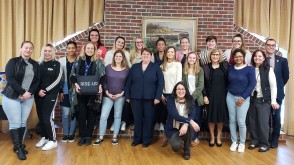Bay Path University and the Hampden County Sheriff’s Department Work Together to Break Down Barriers and Empower Women

What happens when you crumble up a $100 bill? That’s the question that was asked to the 15 women who participated in the RISE-UP collaborative program between Bay Path University forensic psychology students and women at the Western Mass Recovery & Wellness Center (WMRWC), a unit of the Hampden County Sheriff’s Department. Perhaps that $100 bill gets thrown on the floor, it gets stepped on, and it gets dirty. But when you pick it up, and you dust off the dirt, and maybe you tape a ripped edge – no matter its history or its current state, it’s still worth $100.
Like the $100 bill, if someone is abused or mistreated, they still have value. This lesson was the basis of a class exercise completed in the program, and was an important revelation for many of the participants, both WMRWC residents and Bay Path students alike.
Co-founded in 2017 by Barbara Gallo, a Correctional Counselor at WMRWC and Bay Path Professor of Psychology Dr. Diane Hall, RISE-UP stands for resiliency, integration, self-awareness, empowerment, and unlimited possibilities, and abides by their motto of “a minor setback for a major comeback.” The program pairs up undergraduate forensic psychology students and incarcerated women to work together on issues related to self-esteem, relationships, and addiction.
Gathered together for the third RISE-UP graduation ceremony, both Bay Path students and WMRWC residents spoke freely on how the program had changed their lives. “The proof is in me, in how much I’ve grown,” shared WMRWC resident Crystal K. “Dealing with grief and trauma has taught me to surround myself with positive people so that I can make positive changes. I’ve learned to love myself, and it’s allowed me to open up and love and trust again.”
While working on self-esteem and emotional connections may not be the type of work most people first think of when they think of addiction recovery, it’s a critical foundation for all of the work to be done to overcome substance abuse, and is an integral piece of the WMRWC’s philosophy of incorporating education, treatment, and recovery in their work. “We watched you do the very thing that will eradicate addiction,” shared Gallo, as she addressed the WMRWC residents. “You came into that room and you connected. Connection is the opposite of addiction. You have connected. You’ve gotten vulnerable. That is what recovery is.”
To complete the program, the participants gathered together twice a week for six classes, spending three sessions at the WMRWC, and three sessions at Bay Path University. They met in a classroom setting, with every woman, whether a Bay Path student or WMRWC resident, completing the same college level work. Their time together consisted of problem solving, story sharing, and facing their own truths. The result? A group of women, who otherwise may have never met, bonded together. “We’re from two totally different walks of life, and we get together and find so much in common,” said WMRWC resident Angelique A. “So many people won’t even speak to people like us, but you took the time to get to know us.”
For the Bay Path students, all students in the Psychology of Female Offenders course taught by Dr. Hall, this program allowed them the opportunity for experiential learning outside of the classroom. For many of them, this was their first exposure to the population they plan to work with upon graduation. The opportunity allowed them to not only build their resume with real work experience, but allowed them to become comfortable with working in a correctional setting. The WMRWC is a minimum security, community based, residential treatment facility that provides for the custody, care, and treatment of incarcerated substance users, and participating in this program is part of the treatment for select residents. “If there’s anything on campus that speaks to our campus theme of creating brave spaces, it’s the fifteen of you and what you’ve created,” shared Hall as she spoke to the Bay Path students and WMRWC residents.
On their first visit, the students were apprehensive about entering the WMRWC facility, unsure of what, or who, to expect. But after meeting the women they would be working with, that worry faded away and was replaced with a comfort and confidence in the work they’re doing. Bay Path student Noelle Bisignano shared, “I’ve learned things that I never would have learned in a textbook.” Her classmates shared her sentiments, with many of them proclaiming this to be the best part of their Bay Path experience and remarking on just how special this program is as a part of their coursework.
It’s a special program for not only the Bay Path students and WMRWC residents, but for all of the staff and faculty involved, too. “I’m pleased to see some of the women in our custody participate in this important program,” shared Hampden County Sheriff Nicholas Cocchi. “Our goal with all individuals in our custody is to return them to our communities better prepared to be productive, law abiding and contributing citizens. We are proud of our long-standing partnership with Bay Path University.”
The graduation ceremony was a true testament to the work completed in the program, with several students, staff members, and WMRWC residents shedding tears, and laughs, as they told their stories of having their lives changed. “This program is your opportunity to be embraced by love,” shared Bay Path’s President Dr. Carol Leary at the closing of the ceremony. “I’m going to be watching each and every one of you and hoping that I see how you change the world, because you have all been changed today.”
